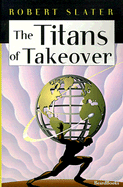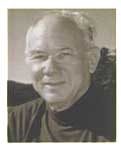|
|
|
|
||||||

|
The Titans of Takeover
By Robert Slater 1999/11 - Beard Books 1893122506 - Paperback - Reprint - 266 pp. US$34.95 This revealing account deals not only with those giant figures who perpetrated takeovers, but also with other featured players: investment bankers, attorneys, and arbitrageurs. Publisher Comments The Titans of Takeover tells the story of corporate raiders--the men in the 1980s who discovered great financial opportunities in seizing control of someone else's business, often at bargain prices. Profiled in these pages are such leading figures in the American takeover field as T. Boone Pickens, Carl Icahn, Saul Steinberg, and Ted Turner. From the back cover blurb: The story told in The Titans of Takeover is that of the corporate raiders -- the men who in the 1980s discovered great financial opportunities in seizing control of someone else's business, often at bargain prices. With millions of dollars at stake, these raiders aroused massive public attention and, depending on point of view, were for a while either the villains or the saviors of American business. The book looks not only at the raiders, but also at other featured players in the takeover game: the investment bankers, attorneys, and arbitragers. Profiled in these pages are the leading figures in the American takeover field, including T. Boone Pickens, Carl Icahn, Saul Steinberg, and Ted Turner as well as such behind-the-scenes personalities as lawyers Martin Lipton and Joseph Flom, investment bankers Joseph Perella and Bruce Wasserstein, and arbitrager Ivan Boesky. Review by Susan Pannell Once upon a time - and for a very long time - corporate behemoths decided for themselves when and if they would merge. No doubt such decisions were reached the civilized way, in a proper men's club with plenty of good brandy and better cigars. Like giants, they strode Wall Street, fearing no one save the odd trust-busting politico, mutton-chopped at the turn of the twentieth century, perhaps mustachioed in the 1960s when the word was no longer trust but monopoly. Then came the decade of the 1980s. Enter the corporate raiders, men with cash on hand, shrewd business sense, and not a shred of reverence for the Way Things Have Always Been Done. These businesspeople - T. Boone Pickens, Carl Icahn, Saul Steinberg, Ted Turner - saw what others missed: that many of the corporate giants were anomalies, possessed of assets well worth possessing yet with stock market performances so unimpressive that they could be had for bargain prices. When the corporate raiders needed expert help, enter the investment bankers (Joseph Perella and Bruce Wasserstein) and the M&A attorneys (Joseph Flom and Martin Lipton). And when the merger went through, enter the arbitragers who took advantage of stock run-ups, people like Ivan "Greed is Good" Boesky. The takeover frenzy of the 1980' looked like a game of Monopoly come to life, where billion-dollar companies seemed to change ownership as quickly as Boardwalk or Park Place on a sweet roll of the dice. By mid-decade, every industry had been affected: in 1985, 3,000 transactions took place, worth a record-breaking $200 billion. The players caught the fancy of the media and began showing up in the news until their faces were almost as familiar to the public as the postman's. As a result, Jane and John Q. Citizen's interest in Wall Street began its climb from near zero to the peak where (for different reasons) it is today. What caused this avalanche of activity? Three words: President Ronald Reagan. Perhaps his most firmly held conviction was that Big Business was being shackled by the antitrust laws, deprived a fair fight against foreign competitors that had no equivalent of the Clayton Act in their homelands. Reagan took office on January 20, 1981, and it wasn't long after that that his Attorney General, William French Smith, trotted before the D.C. Bar to opine that, "Bigness does not necessarily mean badness. Efficient firms should not be hobbled under the guise of antitrust enforcement." (This new approach may have been a necessary corrective to the over-zealousness of earlier years, exemplified by the Supreme Court's 1966 decision upholding an enforcement action against the merger of two supermarket chains because the Court felt their combined share of 8% (yes, that's "eight percent") of the Los Angeles market was potentially anticompetitive.) Raiders, investment bankers, lawyers, and arbitragers, plus the fun couple Bill Agee and Mary Cunningham - remember them?- are the personalities profiled in Robert Slater's book, originally published in 1987. Slater is a wonderful writer, and he's given us a book no less readable for being absolutely stuffed with facts, many of them based on exclusive behind-the-scenes interviews. 
Robert Slater holds degrees from the University of Pennsylvania and the London School of Economics and has authored several business books, which have been on the bestseller lists for Business Week and The Wall Street Journal. He was a journalist for UPI and Newsweek magazine in the 1970s, and for Time magazine from 1976 to 1996.
|
|
|
|
home
| about
us | contact
us | related
sites |